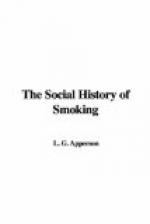There is a curious entry in Thomas Burton’s diary of the proceedings of Cromwell’s Parliament, which suggests that there may then have been the luxury of a members’ smoking-room. Burton was a member of the Parliaments of Oliver and Richard Cromwell from 1656 to 1659, and made a practice—for which historical students have been and are much his debtors—of taking notes of the debates as he sat in the House. Members sometimes objected to and protested against this note-taking, but Burton quietly went on using his pencil, and though his summaries of speeches are often difficult to follow, argument and sense suffering by compression, he has preserved much very valuable matter. Referring to a debate on January 7, 1656-57, on an attempt to go behind the previously passed Act of Oblivion, the diarist records that “Sir John Reynolds had numbered the House, and said at rising there were 220 at the least, besides tobacconists.” This can only mean that there were at least 220 members actually present in the House when it rose, not counting the “tobacconists” or smokers, who were enjoying their pipes, not in the Chamber itself, but in some conveniently adjoining place, which may have been a room for the purpose, or may simply have been the lobby referred to above in the extract from “Mercurius Pragmaticus.”
It seems likely that Richard Cromwell was a smoker. In 1689, long after he had retired into private life and had ample leisure for blowing clouds, he sent to a friend a “Boxe of Tobacco,” which was described as “A.J. Bod (den’s) ... best Virginnea.” In a letter to his daughter Elizabeth, dated 21 January 1705, there is a reference to this same dealer, whom he describes as “Adam Bodden, Bacconist in George Yard, Lumber [Lombard] Street.” The allusion is worth noting as a very early instance of the colloquial trick of abbreviation familiar in later days in such forms as “baccy” and “bacca” and their compounds.
V
SMOKING IN THE RESTORATION PERIOD
The Indian weed withered quite
Green at noon, cut down at
night,
Shows thy decay—
All flesh is hay:
Thus
think, then drink tobacco.
GEORGE WITHER (1588-1667).
The year 1660 that restored Charles II to his throne, restored a gaiety and brightness, not to say frivolity of tone, that had long been absent from English life. The following song in praise of tobacco, taken from a collection which was printed in 1660, is touched with the spirit of the time; though it is really founded on, and to no small extent taken from, some verses in praise of tobacco written by Samuel Rowlands in his “Knave of Clubs,” 1611:
To feed on flesh is gluttony,
It maketh men
fat like swine;
But is not he a frugal man
That on a leaf
can dine?
He needs no linnen for to
foul
His fingers’
ends to wipe,
That has his kitchin in a
box,
And roast meat
in a pipe.




